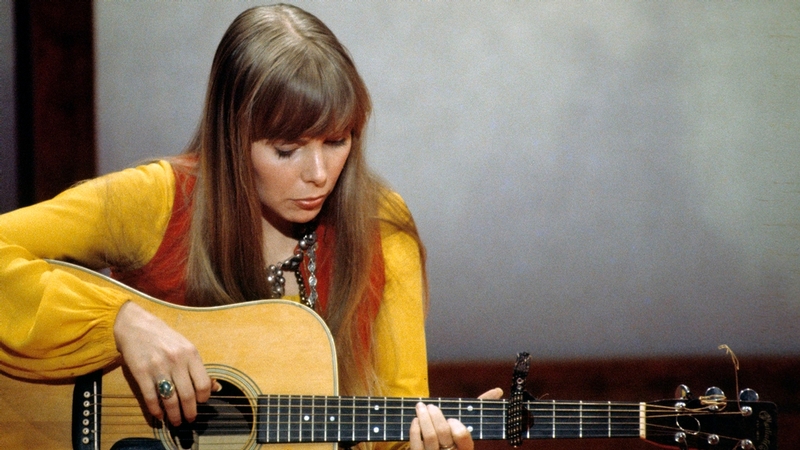
Joni Mitchell on 'The Johnny Cash Show' in 1969
There was something in the air in 1970 - and songwriters did not like it. The year produced a stream of environmental protest songs, all of which have proved sustainable. "Apeman" by The Kinks, Neil Young's "After the Gold Rush" and Cat Stevens' "Where Do the Children Play?" all captured the mood of ecological concern.
The most renewable of all, however, has been Joni Mitchell's "Big Yellow Taxi", which has become the indisputable environmental anthem. According to Mitchell's own website, at least 456 artists have recorded the song, and since 1990 someone has recorded it virtually every year. She herself has recorded it three times, the second, live version in 1974 proving a bigger hit than the original.
There were specific reasons for environmental angst at the time. A massive oil spill off Santa Barbara, California, in 1969, then the worst in American history, caused widespread shock and outrage. The oil platform explosion, which released some 3m gallons of crude in a 35-mile slick along the Pacific coast, proved formative in the birth of the modern environmental movement.
The year also included the sight of the heavily polluted Cuyahoga River in Ohio catching fire, with the flames soaring five storeys high as oil and chemical waste slicks were ignited by sparks from a passing train. This prompted the US Congress to pass the The National Environmental Policy Act in 1970.
Mitchell's inspiration for her song came from a 1969 trip to Hawaii. "I walked over to the [hotel room] balcony and there was the picture-book scenery, palm trees swaying in the breeze and all," she told New Musical Express. "When I looked down... there below my view was this ugly, concrete car park on the hotel grounds."
This gave her an unforgettable chorus, which has been a nagging reminder to humanity ever since. "Don't it always seem to go, you don't know what you've got till it's gone / They paved paradise and put up a parking lot."
She was also struck by Honolulu's "tree museum", which "charged the people a dollar and a half just to see 'em", as the second verse relates. This was a reference to the island's Foster Botanical Garden and its tree collection.
The song's genius lies in the joyful, jaunty rhythm of Mitchell's acoustic guitar and delightful melody being at odds with the sombre lyrics. This contrast is compounded by her brief, playful bass vocal and giggle at the end.
The last verse poignantly presses the message of taking precious things for granted, as it switches from the political to the personal. "Late last night I heard the screen door slam / And a big yellow taxi took away my old man."
The myriad cover versions have included a variety of musical styles from artists on all rungs of the celebrity ladder. Bob Dylan produced a laboured, word-mangling effort in 1973 on the album Dylan. In fairness, the record comprised several outtakes released by Columbia without his authorisation after he had left the record company.
California band Pinhead Gunpowder provided a high-speed punk rendition in 1992, and Big Country's rock version four years later infused it with eastern-sounding violin and percussion. Counting Crows had an international hit with the song after first recording it in 2002, and re-recorded it for the soundtrack of the 2006 film Two Weeks.
Inflation made artists tinker with the lyrics over the years. Amy Grant swapped "a dollar and a half" for "25 bucks just to see 'em" in 1994, and Mitchell herself made it "an arm and a leg" on her 2007 version on the album Shine. This was a jazzier, more reflective interpretation that also suited her ageing, deeper voice.
Over the decades "Big Yellow Taxi" has remained a "go to" tune for environmental radio and television programmes. With climate change now the planet's existential challenge, the song looks set to keep ringing out for teenage campaigner Greta Thunberg's generation and beyond.
Copyright protected material on this website is used in accordance with 'Fair Use', for the purpose of study, review or critical analysis, and will be removed at the request of the copyright owner(s). Please read Notice and Procedure for Making Claims of Copyright Infringement.
Added to Library on September 9, 2019. (15932)
Comments:
Log in to make a comment